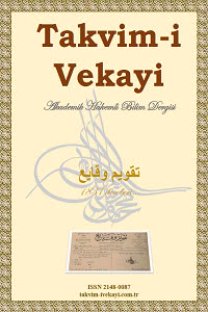Bir Vesayet Aracı Olarak Büyük Ortadoğu Projesi ve Terörizm Üzerine Bir Değerlendirme
Büyük Ortadoğu Projesi, Terörizm, Barış ve İstikrarın Tesisi
An Assessment of the Greater Middle East Project and Terrorism as A Tool of Tutelage
___
- Achcar, G. (2004). Greater Middle East: the US Plan. Le Monde Diplometique, English Edition.
- Adams, J. (1986). The Financing of Terror. Sevenoaks, Kent: New English Library.
- Aust, A. (2010). Handbook of International Law, Cambridge: Cambridge University Press.
- Cary, F. (2009). The Middle East and the Persian Gulf as the gateway to imperial crisis – The Bush Administration in Iraq. In: David Ryan, Patrick Kiely (Hrsg.): America and Iraq – Policy-Making, Intervention, and Regional Politics, London: Routledge.
- Ceylan, Ş. Ş. (2006). "Francıs Fukuyama ve Tarihin Sonu Tezi", İstanbul Ticaret Üniversitesi Sosyal Bilimler Dergisi, 5(10), 233-252.
- Darwin, C. (1859). On the Origin of Species by Means of Natural Selection or the Preservation of Favoured Races in the Struggle for Life. 1st ed.), John Murray: London: p.502.
- Rothschild, E.; Buzan, B.&Hansen, L. (2007). What is Security, London: Sage Publications Ltd.
- Encyclopædia Britannica. (2020). Terrorism.
- Fukuyama, F. (1992). Yeni Dünya Düzeni, İstanbul: Ağaç Yayınları.
- Fukuyama, F. (1995). Tarihin Sonu mu, Ankara: Vadi Yayınları.
- Gurcan, M. (2012). Savaşın Evrimi ve Teorik Yaklaşımlar, Teoriler Işığında Savaş, Barış ve Çatışma Çözümleri, İstanbul: Bilgesam Yayınları.
- Heryanto, A. (2006). State Terrorism and Political Identity in Indonesia: Fatally Belonging, London: Routledge. p. 161.
- Mackey, R. (2009). Can Soldiers Be Victims of Terrorism, New York: The New York Times.
- Mohssen, M. (2013). "Demokratisierung des Greater Middle East", Aus Politik und Zeitgeschichte. 45.
- Munich Security Conference (2015). Munich security report collapsing order, reluctant guardians? Erişim tarihi 21 Mayıs 2018.
- Olivier, R. (2010). Der falsche Krieg – Islamisten, Terroristen und die Irrtümer des Westens. Pantheon, München: Siedler.
- Osmańczyk, Jan Edmund (2002). Encyclopedia of the United Nations and International Agreements, Abingdon: Routledge Books. p.1869.
- Osterud, Oyvind. (2008). "Global Conflict Trends: a Rejoinder", Conflict, Security & Development, 8.3: 383-386.
- Ottaway, M. &Carothers, T. (2004). "The Greater Middle East Initiative: Off to a False Start. Policy Brief", Carnegie Endowment for International Peace, 29, 1–7.
- Perthes, V. (2004). "America's Greater Middle East and Europe", Middle East Policy, Volume 11 (3), 85–97.
- Ruthven, M. &Nanji, A. (2017). Historical Atlas of Islam, Harvard: Harvard University Press.
- Sinclair, S. J. &Antonius, D. (2012). The Psychology of Terrorism Fears, Oxford: Oxford University Press, p. 14.
- Sun Tzu (2007). The Art of War, London: Special Edition Books.
- Teichman, J. (1989). "How to Define Terrorism. Philosophy", 64 (250): 505–517.
- The Committee On Foreign Relatıons United States Senate (2004). "The Greater Mıddle East Inıtıatıve: Sea Island And Beyond Hearıng", U.S. Government Prıntıng Offıce Washıngton, 108/2.
- Waewer, O. (2008). "Toplumsal Güvenliğin Değişen Gündemi", Uluslararası İlişkiler, 5(18), 151-178.
- White, J. R. (2016). "Terrorism and Homeland Security", Cengage Learning, 3. Wisnewski, J. J. (2008). "Torture, Terrorism, and the Use of Violence", Review Journal of Political Philosophy. 6 (1). p. 175.
- Yadgar, Y. (2016). "A Myth of Peace: The Vision of the New Middle East' and Its Transformations in the Israeli Political and Public Spheres", Journal of Peace Research. 43 (3): 297–312.
- Yayın Aralığı: Yılda 2 Sayı
- Başlangıç: 2013
- Yayıncı: Eyüp Fahri KESKENLER
Rusya'da Wagner Krizi ve Etki Alanı
Bulanık Mantık Kavramına Genel Bir Bakış
Hasan YILMAZ, Mustafa Ergin ŞAHİN
Bir Vesayet Aracı Olarak Büyük Ortadoğu Projesi ve Terörizm Üzerine Bir Değerlendirme
Sakız Adası’nda Ahalinin Zararına Bir İşletme “Sakız Liman ve Rıhtım Şirketi”
